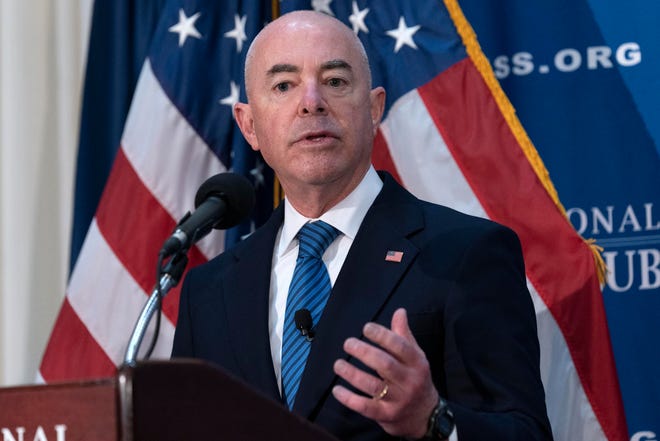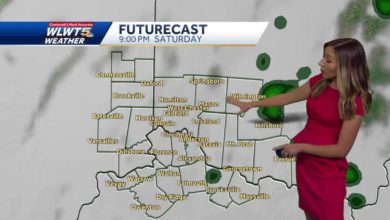Federal health officials today announced they are recommending a pause in the use of the one-shot Johnson & Johnson vaccine because of blood clots "out of an abundance of caution."
"Vaccine safety is a top priority for the federal government, and we take all reports of health problems following COVID-19 vaccination very seriously," the Food and Drug Administration and Centers for Disease Control and Prevention said in a statement.
New York and Ohio were among several states announcing a pause almost immediately.
As of April 12, more than 6.8 million doses of the Johnson & Johnson vaccine have been administered in the U.S. CDC and FDA are reviewing data involving six reported U.S. cases of a rare and severe type of blood clot – cerebral venous sinus thrombosis –in individuals after receiving the J&J vaccine, the statement said. All six cases occurred among women 18 to 48, and symptoms occurred six to 13 days after vaccination.
One of the six patience died and other was in critical condition, officials said. FDA chief Janet Woodcock said no definitive cause had been determined, but that it appears to be an extremely rare immune response. Officials said that such clots are treated differently from other clots, and that incorrect treatment could cause death.
The CDC will convene a meeting of the Advisory Committee on Immunization Practices on Wednesday to further review the cases and assess their potential significance.
Jeff Zients, White House COVID-19 Response Coordinator, said the pause would have little impact on vaccine availability.
"Johnson & Johnson vaccine makes up less than 5% of the recorded shots in arms in the United States to date," Zients said. "Based on actions taken by the president earlier this year, the United States has secured enough Pfizer and Moderna doses for 300 million Americans."
The pause is an example of a "double-edged sword in public health interventions," said Ogbonnaya Omenka, an associate professor and public health specialist at Butler University in Indianapolis.
"The decision is indicative of vigilance and swiftness of action, which are both necessary for effectively dealing with public health threats," he told USA TODAY. "At the same time, there is a risk of the decision feeding into the already existing vaccine hesitancy. ... Nevertheless, this step is in the interest of the public, because it is the duty of the authorities involved to be safe instead of sorry.
Have questions about the J&J vaccine you want answered? Submit them here and we’ll use your question to compile a FAQ for the group.
Also in the news:
►“Hamilton” creator Lin-Manuel Miranda joined New York City Mayor Bill de Blasio on Monday at the grand opening of a Times Square COVID-19 vaccination site intended to jump-start the city’s entertainment industry.
►For the first time in months, shops, hairdressers and pub "gardens" reopened Monday in England. British Prime Minister Boris Johnson has urged people to “behave responsibly.” Northern Ireland's "stay-at-home" order is ending and some rules are being relaxed in Scotland and Wales.
►The Chicago Cubs are concerned about a possible COVID-19 outbreak after two coaches tested positive for the virus and three relievers were placed on the COVID-19-related injured list.
► Haiti has not received a single dose of the COVID-19 vaccine even though countries began receiving dosage from the World Health Organization five weeks ago, reported The Miami Herald.
►All schools in Canada’s most populous province of Ontario will be shut down and move to online learning because of a record number of coronavirus infections fueled by more-contagious virus variants, the province’s premier announced Monday. Premier Doug Ford said his government is moving to online-only after the April break this week.
? Today's numbers: The U.S. has more than 31.2 million confirmed coronavirus cases and 562,500 deaths, according to Johns Hopkins University data. The global totals: 136.7 million cases and 2.94 million deaths. More than 237.79 million vaccine doses have been distributed in the U.S. and 189.96 million have been administered, according to the CDC.
USA TODAY is tracking COVID-19 news. Keep refreshing this page for the latest updates. Want more? Sign up for our Coronavirus Watch newsletter for updates to your inbox and join our Facebook group.
Youth sports linked to Michigan surge
Michigan hospitalizations reached 3,953 on Monday, surpassing the state's November/December spike. Among the biggest drivers of coronavirus infections in the state, health officials have said, are outbreaks among youth athletes and those associated with K-12 schools. This week, the state reported 312 ongoing or new school outbreaks, which includes infections linked to classrooms, after-school activities and sports.
"While they may not be getting it directly from the sporting event, there's a lot of things that go along with sports," said Dr. Matthew Sims, director of infectious disease research at Beaumont Health. "A lot of people go in to watch. There's the celebration after, where people are gathering together."
– Kristen Jordan Shamus and Christina Hall, Detroit Free Press
Get a doughnut with a jab? Freebies combat vaccine hesitancy
Hesitant to get a COVID vaccine? Would a free doughnut or Amazon gift card change your mind? When Krispy Kreme recently offered free donuts to Americans who get vaccinated, it weathered backlash from critics who said the marketing effort might help ease the pandemic but would also contribute to the obesity epidemic. Still, don’t be surprised if other businesses and local and state governments begin offering even more substantive incentives, such as gift cards, to people who might otherwise resist the shots.
“It will depend on the company, but generally speaking it can be a positive thing,” Bunny Ellerin, director of the Healthcare and Pharmaceutical Management Program at Columbia Business School, said of the giveaways. “It’s positive reinforcement.”
– Nathan Bomey
Oregon fines Twisted River Saloon in Springfield $18K for violating COVID-19 rules
An Oregon saloon was fined more than $18,000 on Monday for “violating three standards” to protect employees from COVID-19.
The $18,430 fine was leveled against the Twisted River Saloon in Springfield, which “willfully continued to potentially expose workers to the virus” by allowing indoor dining beginning roughly around Jan. 4 and continuing until Feb. 26, according to the release from Oregon Occupational Safety and Health Administration.
At that time, Lane County was designated as an “extreme risk” for COVID-19 transmission, and indoor dining was supposed to be at zero capacity.
During an inspection, owner James Butt said he chose to reopen the saloon even though he was aware it was against workplace health requirements, the release says.
– Louis Krauss, Register-Guard
CDC says Michigan not likely to get extra vaccines to combat surge
The federal government is not inclined to ship extra vaccine supplies to Michigan to combat the state's severe surge in cases, the director of the Centers for Disease Control and Prevention said Monday.
Dr. Rochelle Walensky noted that it takes two to six weeks from the time vaccines are jabbed until the impact could be realized.
"When you have an acute situation, an extraordinary amount of cases like we have in Michigan, the answer is not necessarily to give vaccine, the answer is to really close things down," Walensky said at a White House COVID response briefing. "If we tried to vaccinate our way out of what is happening in Michigan we would be disappointed that it took so long for the vaccine to work, to actually have the impact."
Andy Slavitt, the White House senior COVID adviser, said shifting vaccine supplies "to play Whac-a-Mole isn't the strategy that public health leaders and scientists have laid out."
These colleges were more likely to provide in-person learning
Colleges looking to enroll more students or those in Republican-controlled states were the most likely to reopen for in-person learning during the fall 2020 semester, according to a study by the College Crisis Initiative, a group at Davidson College that has been tracking how colleges responded to the pandemic.
The researchers found that colleges that accept fewer applicants and whose students are more academically prepared were more likely to be online during the pandemic. And those that accepted more students and were in Republican-controlled states were more likely to be in-person compared to colleges in blue states.
What didn’t seem to influence a college’s plan to open in-person? Coronavirus cases. The researchers wrote they didn’t find an association between a state’s coronavirus infection rate per 100,000 residents and college’s plans to offer online or in-person courses.
– Chris Quintana
Contributing: The Associated Press
Source link







